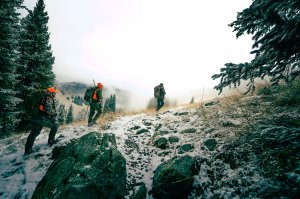Without question, the much anticipated whitetail rut can be action-packed and electrifying for hunters. However, there is still a lot quality deer hunting left long after the rut has fizzled out. In fact, one of my favorite times to chase top-heavy bucks is actually during the late-season or post-rut period. For good reason, cold nighttime temperatures, dwindling food sources and limited outside hunting pressure are all factors that can potentially place a veteran buck in a vulnerable situation. The following post-rut hunting strategies will help you pinpoint, pattern, and connect with a shooter that has survived most of the season. On a side note, these tactics allowed me to take a really nice buck in Tennessee just a few days ago (pictured here).
The Food Factor
During the early segments of season, whitetails basically enjoy an all-you-can-eat buffet and have plenty of feeding options. However, by the time December rolls around, many of these food sources have been exhausted. This is why pinpointing a primary food source is the key to punching tags during the late-season. In heavily wooded areas, try to find pockets of remaining acorns, honey-suckle, or green browse. Thickets or locations that have recently been logged will often contain green briar and other post-rut food sources. When hunting agricultural areas or farm country, try to locate late-picked corn fields, winter wheat plots, and oats.
Focus On Winter Cover
Next, pinpoint thick low-lying cover that is near a remaining food source. Strategically hanging stands along the edges of these areas can pay huge dividends during morning hunts when bucks are traveling back to bed-down for the day. These spots can also be productive during the late-morning and mid-day hours. In many cases, bucks will ease off the bed to stretch and browse around during these periods, which creates a window of opportunity.
Recognize The Secondary Rut
Approximately 28 days after the primary rut, mature does that were not successfully bred will enter a second estrous cycle. During this same time frame, yearling does will hit their first estrous cycle. The secondary rut is usually not as chaotic and action-packed as the first rutting period, but it can still be very productive. Some of the same rut-hunting strategies that worked earlier will once again be effective. Drag-lines soaked in estrous scent, doe decoys, and calling that consists of young doe bleats can be deadly during the secondary rut.
With that being said, be sure to give all of these post-rut tactics a try in your neck of the woods. Having the right game plan and hitting the field hard during the post-rut period can be all it takes to punch that one last tag. Plus, there is no better feeling than knocking a big buck in the dirt just before the final buzzer rings! Good luck and keep us posted on the BBZ.

